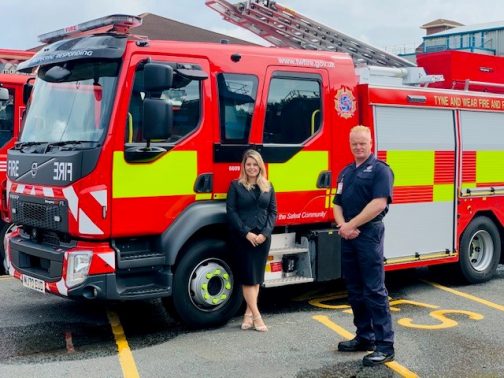

More youth services are needed to tackle ASB says PCC and Fire Chief
2nd September 2020
MORE youth diversionary activities are the answer to curb growing anti-social behaviour problems, say two top North East police and fire figures.
As ASB goes up, so do related fire incidents and both Police and Crime Commissioner, Kim McGuinness, and Tyne and Wear Fire and Rescue Service Chief Fire Officer, Chris Lowther, share fears ASB could escalate, as the region recovers from the impacts of the Coronavirus.
TWFRS has attended 1430 ASB related fire incidents between 01 April 2020 and 21 August 2020. The incidents take valuable resources away from their primary role of protecting life and property.
These figures also come at a time when young people have experienced the upheaval of lockdown, a lack of school routine, exam results chaos and now the ever-growing threat of youth unemployment hitting an all-time high.
Northumbria Police and Crime Commissioner, Kim McGuinness, said: “After years of austerity and the recent challenges brought by Covid-19, the ongoing battle to tackle ASB is only going to get tougher – especially if we don’t look at the causes and do something about them.
“Problems are often linked to drink, drugs and deprivation. Many young people have had a tough time of late. Most kids who get up to trouble do so because they are bored. We know this because they tell us. They’ll say they simply have nothing better to do. So, we need to be putting a better option right there in front of them, giving them chances and choices.”
Speaking at a meeting with the fire service last week, Kim said: “Nobody here is measuring success in terms of how many arrests we make or the amount of fires we put out. Success for us is reducing the number of times people need to call our services for help. We both want the communities we serve to be the safest they can be and education is key.
“It’s about listening to and working with young people, finding out what’s going wrong in their lives and helping them to turn things around whether it be through sport, youth clubs or any place where they can meet positive, supportive role models and gain new skills and aspirations.
“We know this approach works, my Violence Reduction Unit has seen some fantastic results in areas where young people have been presented with opportunities, but youth services come at a price. If we don’t invest early on we have to pick up the pieces later and I worry the Government is still yet to grasp this. Youth services are the real emergency service and it’s our young people we have to rescue before it’s too late.”
Tyne and Wear Fire and Rescue Service Chief Fire Officer, Chris Lowther, went on to explain: “Anti-social behaviour is one of the biggest challenges that we face. There’s clearly a need to educate young people on the consequences of their actions, particularly when it comes to deliberate fires.
It may seem like harmless fun, but even small fires put people at risk because our crews can’t be in two places at once. If we’re called out to a wheelie bin fire, that could affect our ability to respond to a life-threatening car accident or house fire.
Firefighters are often met with hostility when they’re called out to deliberate fires and we have seen too many instances of verbal abuse and even physical attacks. Youth engagement programmes, like those offered at our Community Hub in Sunderland, not only give young people the chance of a brighter future, but they also help them to see emergency service workers as role models they can trust – not the enemy. ”
According to Northumbria Police, reports of anti-social behaviour (ASB) rose during the coronavirus lockdown, although this can at least partly be attributed to ‘COVID-related offences’ being recorded as ASB.
ENDS






